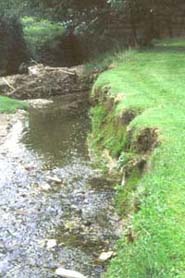
Eroded Stream Bank
What we do in our yards often affects our neighbors and the environment.
Water Pollution:
- from excess application and improper use and disposal of pesticides and fertilizers
- from erosion
- from spills during refueling of power equipment
The average homeowner over-applies pesticides and fertilizers, often at rates many times that of farmers. Most people dump excess pesticides on the ground, in drains, and in the trash rather than taking them to hazardous waste collection sites. Turf has shallow roots and is a poor stabilizer of stream banks; heavy rains often result in bank erosion and stream siltation. Tens of millions of gallons of gasoline are spilled each year while refueling garden equipment. For more information on preventing pollution in storm water, see EPA mid-Atlantic's overview.
Air Pollution:
- from operating and refueling of landscape equipment, vehicles
Emissions from landscape equipment (mowers, blowers, trimmers, etc.) are often much greater than that of a car per hour of operation. Small gasoline-powered engines are the most polluting.
Noise Pollution:
- from operation of power equipment and vehicles
In warm weather, residential areas are rarely peaceful due to the use of mechanical landscape equipment. The operators of landscape equipment are in danger of hearing impairment.
Consumption of Natural Resources:
- coal and gas to generate electricity and fuel landscape equipment
- water to irrigate plants
- soil lost through erosion
- peat moss to amend soil (peat moss often comes from wetlands)
The world only has a limited supply of natural resources and consumption rates are increasing. 30% of water consumption in urban areas in the eastern United States is for watering lawns.
Solid Waste:
- grass clippings and leaves
Nearly 1/5 of all municipal solid waste collected is organic matter (yard waste) that could be composted on site. While some is composted by municipalities, much ends up in landfills that are quickly reaching capacity.
Health and Safety:
- exposure to chemical pesticides
- accidents from power tools and equipment
Many gardeners over apply or improperly apply pesticides, putting themselves, their families, and pets at increased health risk. Nearly half of all households have pesticides stored within reach of children. About 230,000 people each year are treated in hospital emergency rooms for injuries relating to various lawn and garden tools. Our clean air and drinking water are impacted from pesticides and garden equipment emissions.
Declining Bio diversity (number and variety of plants and animals):
- introduction of invasive plants into the landscape
- clearing land
- planting too few species that benefit wildlife
- overuse of pesticides
When non-native plants "escape" from our gardens and take over natural areas they choke out the wide variety of native plants on which wildlife depends. Our desire for new homes on larger lots results in significant clearance of natural areas which fragments wildlife habitat. While less than 10% of all insects are harmful to plants, most pesticides are harmful or lethal to all insects.
Flooding:
- clearing land
- extensive use of grass as a ground cover
A lawn absorbs less storm water than a woods or a diverse planting of trees, shrubs, and ground covers. Extensive use of grass causes more water to run off, contributing to flooding problems in suburbs where woodlands have been cleared. Grading and landscaping that aims at moving rainwater off site as quickly as possible not only increases flooding, but lowers groundwater supplies and increases stream pollution.
Labor, Cost Intensive:
- formal landscapes and lawns are heavily dependent upon mechanical equipment, labor, pesticides, fertilizers, and supplemental watering
The average 1-acre lawn costs $700 and requires 40 hours of labor each year to maintain -- much more than a natural landscape.
 Print
Print Email
Email







